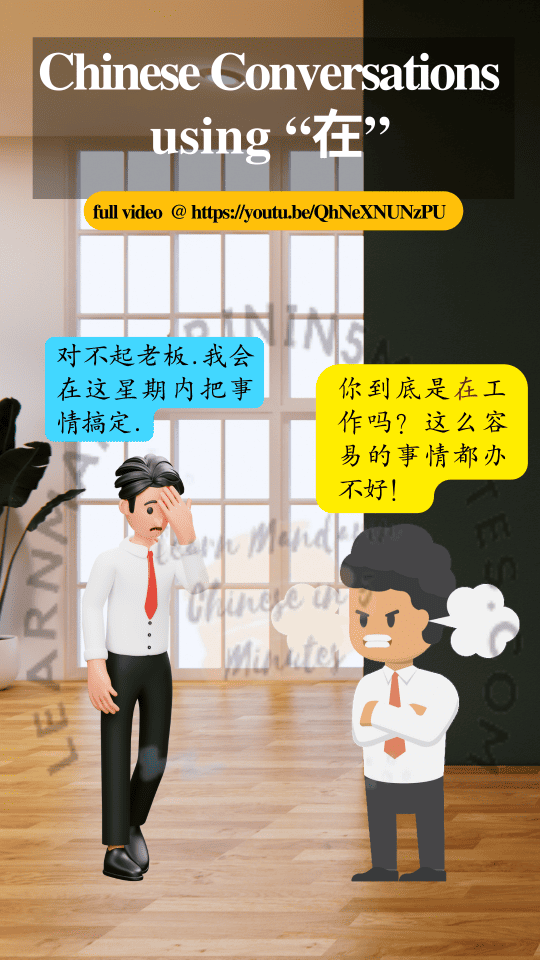The Chinese word “在” (zài) is a fundamental word used to indicate location or existence in a particular place. It plays a crucial role in Chinese sentences related to location, actions, and ongoing activities. In this post, let us go through the 5 ways “Zai” is used and the mistakes that Chinese learners make when using the word “Zai”.

5 ways to use “在” (zài)
1. Using 在 as verb to express existence or location of a person or thing
Express location :-
Sentence Structure : subject + 在 + location
他在厨房。Tā zài chú fáng. – He is in the kitchen. (Kitchen is the location and 他 is the subject)
手机在桌子上。Shǒu jī zài zhuō zi shàng. – The cellphone is on the table. (桌子上 is the location and 手机 is the subject)
The object generally refers to a location / place.
Express existence:-
他的父母都还在。Tā de fù mǔ dōu hái zài. (在 expresses the existence)
The “在” here has two meanings – First meaning – when someone ask whether the parents are still around in the house, you can answer “”在”. Second meaning – when someone ask whether your parents are still alive, “在” can also be used as in 健在” jiàn zài.
2. Expressing Ongoing Actions:
“在” can also be used to show that an action is happening at a specific location.
在 + location+ action structure
他在厨房里煮饭。Tā zài chú fáng lǐ zhǔ fàn. – He is cooking in the kitchen. (cooking is the action /
他在公司上班。Tā zài gōng sī shàng bān- He is working at the company.
3. Using 在 as a preposition
a. Showing what the person is doing in a location (Subject + Zai + location + action)
他在美国留学。
Tā zài Měi guó liú xué
He is studying abroad in the United States.
(In this sentence, the zai shows the relationship between location, which is America and action, which is studying abroad. )
b. Expressing the time an action has happened / happening
大卫和丽丽的婚礼在这个周末举行。
Dà wèi hé Lìlì de hūn lǐ zài zhè ge zhōu mò jǔ xíng
David and Lily’s wedding will be held on/at this weekend.
(zai answers the question when the wedding will happen – this weekend.)
c. Expressing an abstract concept using zai + a locative word
sentence structure : 在 + abstract phrase + locative word,subject . ….
在我的印象里,他是个很勤劳的人。
Tā zài wǒ de yìn xiàng zhōng shì gè hěn qín láo de rén.
In my impression, he is a very hardworking person.
在老师的细心教导下,彼得终于取得好成绩。
Zài lǎoshī de xì xīn jiào dǎo xià Bǐdé zhōng yú qǔ dé hǎo chéng jì.
Under the careful guidance of the teacher, Peter finally achieved good results.
4. Placing Zai after verbs that implies movement or action
Sentence Structure: Subject + [Special Verb such as 走/坐/扔/吐…] + 在 + Location
小明走在妈妈前面。
Xiǎo Míng zǒu zài māma qián miàn.
Xiao Ming walks in front of his mother.
小丽站在学校门口等爸爸来接她放学。
Xiaoli stands at the school gate waiting for his dad to pick him up from school.”
Xiǎo Lì zhàn zài xué xiào mén kǒu děng bà ba lái jiē tā fang xué.
5. Using 在..看来 to express one’s opinion
在我看来,手机不是小明弄坏的。
Zài wǒ kàn lái, shǒu jī bù shì Xiǎo Míng nòng huài de.
In my opinion, Xiaoming wasn’t the one who broke the cell phone.
在我看来,这裤子不是她缝的。
Zài wǒ kàn lái, zhè kù zi bù shì tā féng de.
In my opinion, these pants were not sewn by her.
Mistakes when using 在
1. Using在” (‘zài’) to indicate both location (处所) and action
I study Chinese in a Chinese Language School.
我学习汉语在汉语学校。
在 structure : Subject + 在 + location, so the correct sentence should be
我在汉语学校学习汉语。我 (subject) + 在 + 汉语学校 (location) + 学习汉语 (action)
The day before yesterday, I bought a beautiful dress at the department store.
前天,我买一件漂亮的裙子在商场。
Just like the previous sentence, 在商场 must be placed after the subject 我, and 买一件漂亮的裙子 at the end of the sentence. Moreover, as the time phrase is 前天, it means the action has been completed, so you need to add “了“ after 买. The correct sentence should be,
前天,我在商场买了一件漂亮的裙子。
qián tiān wǒ zài shāng chǎng mǎi le yī jiàn piào liang de qún zi.
前天 (Time period) /
前天 (Time period) / 我 (subject) / 在 / 商场 (location) / 买 (action) / 一件漂亮的裙子 (object) / 了 (completed action because of time period)
2. When expressing the existence or presence of something.
他在厨房 expressing that he is in the Kitchen. This is a correct sentence. However,
在厨房有很多餐具。In this sentence, when you are expressing that there are many cooking utensils in the Kitchen, you must not use 在 to express an existential sentence (存现句 cún xiàn jù). 有 should be used for existential sentence. The correct sentence is,
厨房里有很多餐具。
3. Using 在 in a prepositional phrase structure
He puts his mobile phone on the table.
他把手机放在桌子。
This sentence is incorrect because using 在 as a preposition phrase structure, it is commonly followed by a locative word (方位词),
you should say, 他把手机放在桌子上。上 is the locative word.
We hope this post helps you to better understand the various ways to say “在” in Chinese. For pronunciation and video presentation of this lesson, please click “here“.
If you want to support us to keep this website running, you can click “here“.
